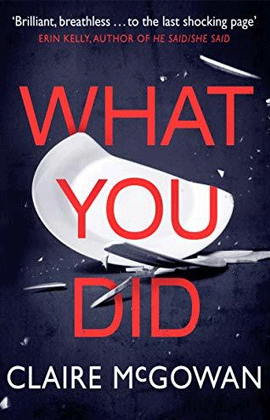
What You Did
$330.00 $297.00
It was supposed to be the perfect reunion: six university friends together again after twenty years. Host Ali finally has the life she always wanted, a career she can be proud of and a wonderful family with her college boyfriend, now husband. But that night her best friend makes an accusation so shocking that nothing will ever be the same again.
When Karen staggers in from the garden, bleeding and traumatised, she claims that she has been assaulted—by Ali’s husband, Mike. Ali must make a split-second decision: who should she believe? Her horrified husband, or her best friend? With Mike offering a very different version of events, Ali knows one of them is lying—but which? And why?
When the ensuing chaos forces her to re-examine the golden era the group shared at university, Ali realises there are darker memories too. Memories that have lain dormant for decades. Memories someone would kill to protect.
Size

The White Tiger: A Novel
$330.00 $297.00
The white tiger of this novel is Balram Halwai, a poor Indian villager whose great ambition leads him to the zenith of Indian business culture, the world of the Bangalore entrepreneur. On the occasion of the president of China’s impending trip to Bangalore, Balram writes a letter to him describing his transformation and his experience as driver and servant to a wealthy Indian family, which he thinks exemplifies the contradictions and complications of Indian society.
Recalling The Death of Vishnu and Bangkok 8 in ambition, scope, The White Tiger is narrative genius with a mischief and personality all its own. Amoral, irreverent, deeply endearing, and utterly contemporary, this novel is an international publishing sensation—and a startling, provocative debut.
Size
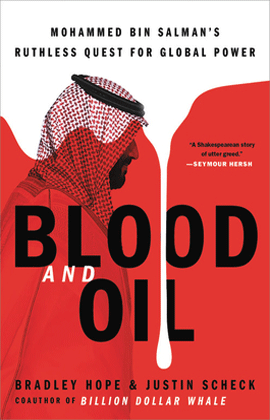
Blood and Oil: Mohammed bin Salman's Ruthless Quest for Global Power
$340.00 $306.00
From award-winning Wall Street Journal reporters comes a revelatory look at the inner workings of the world's most powerful royal family, and how the struggle for succession produced Saudi Arabia's charismatic but ruthless Crown Prince Mohammed bin Salman, aka MBS.
35-year-old Mohammed bin Salman's sudden rise stunned the world. Political and business leaders such as former UK prime minister Tony Blair and WME chairman Ari Emanuel flew out to meet with the crown prince and came away convinced that his desire to reform the kingdom was sincere. He spoke passionately about bringing women into the workforce and toning down Saudi Arabia's restrictive Islamic law. He lifted the ban on women driving and explored investments in Silicon Valley.
But MBS began to betray an erratic interior beneath the polish laid on by scores of consultants and public relations experts like McKinsey & Company. The allegations of his extreme brutality and excess began to slip out, including that he ordered the assassination of journalist Jamal Khashoggi. While stamping out dissent by holding 300 people, including prominent members of the Saudi royal family, in the Ritz-Carlton hotel and elsewhere for months, he continued to exhibit his extreme wealth, including buying a $70 million chateau in Europe and one of the world's most expensive yachts. It seemed that he did not understand nor care about how the outside world would react to his displays of autocratic muscle—what mattered was the flex.
Blood and Oil is a gripping work of investigative journalism about one of the world's most decisive and dangerous new leaders. Hope and Scheck show how MBS' precipitous rise coincided with the fraying of the simple bargain that had been at the head of US-Saudi relations for more than 80 years: oil, for military protection. Caught in his net are well-known US bankers, Hollywood figures, and politicians, all eager to help the charming and crafty crown prince.
The Middle East is already a volatile region. Add to the mix an ambitious prince with extraordinary powers, hunger for lucre, a tight relationship with the White House through President Trump's son in law Jared Kushner, and an apparent willingness to break anything—and anyone—that gets in the way of his vision, and the stakes of his rise are bracing. If his bid fails, Saudi Arabia has the potential to become an unstable failed state and a magnet for Islamic extremists. And if his bid to transform his country succeeds, even in part, it will have reverberations around the world.
Longlisted for the Financial Times & McKinsey Business Book of the Year Award
Size
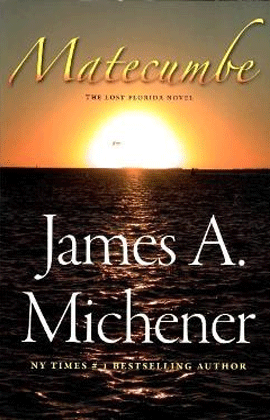
Matecumbe: A Lost Florida Novel
$300.00 $270.00
Pulitzer Prize-winning author James A. Michener was in his sixties when he began traveling frequently to the Florida Keys. One result of those visits was the novel Matecumbe, named after two of the islands that comprise the town of Islamorada, located approximately half way between Miami and Key West.
Never before published, Matecumbe features many of the hallmarks of Michener's best work, including detailed descriptions of place. However, the plot is much more intimate than that found in most of his large-scale, epic historical novels. Focusing on the parallel lives of a woman and her mother, both divorced, Michener spent his creative energy on character development and allegorical storytelling. Random House, his publisher, wasn't pleased, and wanted the mega-best-selling author to concentrate on producing "heavyweight" books like Hawaii and Centennial. Matecumbe seemed too much in the vein of his earlier romance novel, Sayonara. So it sat in a drawer until, eventually, Michener gifted it--including the copyright--to Joe Avenick, his friend and former ghostwriter. Avenick played a key role in the research and writing of Sports in America and Chesapeake, and introduced Michener to Melissa (Missy) DeMaio, who soon became the primary reason for Michener's increasingly frequent visits to the Keys.
Biographers and critics have long agreed that Michener's personality and his characters were both affected by his relationship with DeMaio. As perhaps his most encompassing autobiographical novel, and the one written in the midst of these changes, Matecumbe provides what may be tantalizing glimpses into Michener's life.
Size
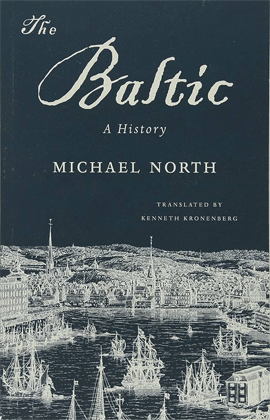
The Baltic: A History
$380.00 $342.00
In this overview of the Baltic region from the Vikings to the European Union, Michael North presents the sea and the lands that surround it as a Nordic Mediterranean, a maritime zone of shared influence, with its own distinct patterns of trade, cultural exchange, and conflict. Covering over a thousand years in a part of the world where seas have been much more connective than land, The Baltic: A History transforms the way we think about a body of water too often ignored in studies of the world’s major waterways.
The Baltic lands have been populated since prehistory by diverse linguistic groups: Balts, Slavs, Germans, and Finns. North traces how the various tribes, peoples, and states of the region have lived in peace and at war, as both global powers and pawns of foreign regimes, and as exceptionally creative interpreters of cultural movements from Christianity to Romanticism and Modernism. He examines the golden age of the Vikings, the Hanseatic League, Gustavus Adolphus of Sweden, and Peter the Great, and looks at the hard choices people had to make in the twentieth century as fascists, communists, and liberal democrats played out their ambitions on the region’s doorstep.
With its vigorous trade in furs, fish, timber, amber, and grain and its strategic position as a thruway for oil and natural gas, the Baltic has been—and remains—one of the great economic and cultural crossroads of the world.
Size
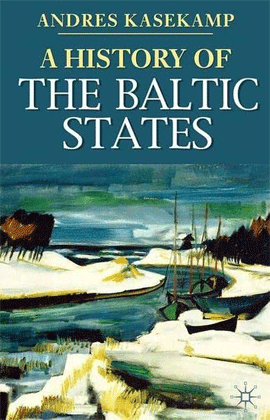
A History of the Baltic States
$300.00 $270.00
Size

God's Generals: Why They Succeeded and Why Some Fail
$320.00 $288.00
In God’s Generals, Roberts Liardon will help you recapture God’s glory with compelling spiritual biographies of some of the most powerful ministries to ever ignite the fires of revival. Liardon faithfully chronicles their lives in this work, along with their teachings, their spiritual discoveries, and many revealing photos.
Four of God’s Generals who you will meet include:
- William J. Seymour, the son of ex-slave, who turned a tiny horse table on Azusa Street, Los Angeles, into an internationally famous center of revival
- Aimee Semple McPherson, the glamourous and flamboyant founder of the Foursquare Church and the nation’s first Christian radio station
- Smith Wigglesworth, the plumber who read no book but the Bible—and raised the dead!
- Kathryn Kuhlman, the beloved evangelist whose miracle-filled meetings drew millions of skeptics to faith
Size
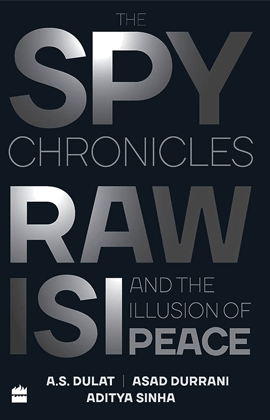
The Spy Chronicles: RAW, ISI and the Illusion of Peace
$350.00 $315.00
Pointing to the horizon where the sea and sky are joined, he says, 'It is only an illusion because they can't really meet, but isn't it beautiful, this union which isn't really there.' -- SAADAT HASAN MANTO Sometime in 2016, a series of dialogues took place which set out to find a meeting ground, even if only an illusion, between A.S. Dulat and Asad Durrani. One was a former chief of RAW, India's external intelligence agency, the other of ISI, its Pakistani counterpart. As they could not meet in their home countries, the conversations, guided by journalist Aditya Sinha, took place in cities like Istanbul, Bangkok and Kathmandu.On the table were subjects that have long haunted South Asia, flashpoints that take lives regularly. It was in all ways a deep dive into the politics of the subcontinent, as seen through the eyes of two spymasters. Among the subjects: Kashmir, and a missed opportunity for peace; Hafiz Saeed and 26/11; Kulbhushan Jadhav; surgical strikes; the deal for Osama bin Laden; how the US and Russia feature in the India-Pakistan relationship; and how terror undermines the two countries' attempts at talks.When the project was first mooted, General Durrani laughed and said nobody would believe it even if it was written as fiction. At a time of fraught relations, this unlikely dialogue between two former spy chiefs from opposite sides--a project that is the first of its kind--may well provide some answers.
Size
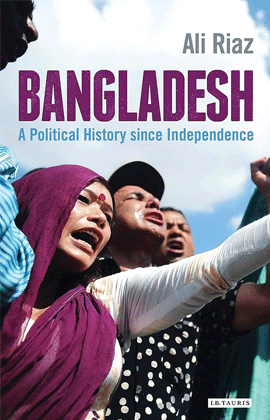
Bangladesh: A Political History Since Independence
$330.00 $297.00
Bangladesh is a country of paradoxes. The eighth most populous country of the world, it has attracted considerable attention from the international media and western policy-makers in recent years, often for the wrong reasons: corruption, natural disasters caused by its precarious geographical location, and volatile political situations with several military coups, following its independence from Pakistan in 1971. Institutional corruption, growing religious intolerance and Islamist militancy have reflected the weakness of the state and undermined its capacity. Yet the country has demonstrated significant economic potential and has achieved successes in areas such as female education, population control and reductions in child mortality. Ali Riaz here examines the political processes which engendered these paradoxical tendencies, taking into account the problems of democratization and the effects this has had, and will continue to have, in the wider South Asian region. This comprehensive and unique overview of political and historical developments in Bangladesh since 1971 will provide essential reading for observers of Bangladesh and South Asia.
